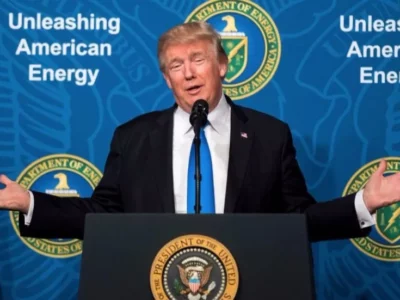Here We Go Again! (Maybe)
Legal Planet: Environmental Law and Policy 2024-07-18

The 2024 election won’t be decided until Election Day. At this point, what we can say is that the prospect of a second Trump term is real. Unlike 2016, when the outcome was a complete surprise to many people, we’re in a position to think ahead about possible policy shifts and possible responses. As the Project 2025 report shows, people on the other side are doing their own contingency planning, and so should climate advocates.
Everything so far in the campaign indicates no shift in Trump’s view of energy policy, which emphasizes national dominance through fossil fuels. The Republican platform underlines this point: ”Common Sense tells us clearly that we must unleash American Energy if we want to destroy Inflation and rapidly bring down prices, build the Greatest Economy in History.” The pledge: “We will DRILL, BABY, DRILL and we will become Energy Independent, and even Dominant again. The United States has more liquid gold under our feet than any other Nation, and it’s not even close.”
That was also Trump’s view in 2016. In that sense, the past is prologue. We can expect many of the same actions, beginning with broad scale regulatory rollbacks (over a hundred rollbacks last time around). We don’t know how that will play out in the courts, though today’s 6-3 conservative majority certainly gives him a better chance than he had in the more balanced 2016 Supreme Court. On the other hand, when the Supreme Court overruled Chevron, it made it harder for agencies to flip their positions with new administrations. We can also expect Trump to follow through on his pledge to withdraw from the Paris Agreement.
To the extent these efforts are successful, they will leave a vacuum in U.S. climate policy. Last time around, states, cities, and corporate actors helped fill the gaps. That will be all the more important this time. State regulatory powers have been somewhat strengthened by the Supreme Court’s decision in the Pork Producers case, which has made it somewhat easier for states to avoid claims they are interfering in interstate commerce. State anti-ESG laws may make it harder for corporations to be open about their climate actions, but the effect on actual corporate policies hasn’t been dramatic, so there is some hope there.
Republicans favor repeal of the Inflation Reduction Act, which authorizes billions of dollars for clean energy. Even J.D. Vance admits that complete repeal might be difficult because there are so many IRA projects in Republican districts. The most likely provision to see repeal would be the tax credit for buying electric vehicles. On the other hand, if Trump follows through on his promise of across-the-board tariff increases, that would be an indirect subsidy to the U.S. production process for renewable energy infrastructure and EV production since foreign imports would become pricier. And of course, once money has gone out the door or new facilities have actually been built due to the IRA, that can’t be undone.
There would also be intangible effect of a Trump second term that would be harder to measure, such as loss of morale on the part of climate advocates and fracturing of international cooperation. Those effects would be impossible to measure but would be very real.
I do not mean to imply that advocates of climate action should be sanguine about a second Trump term. We know from his first term that he is very much in earnest about expanding production of fossil fuels and undercutting clean energy. His reelection would be a big step backwards for climate policy. The question will be how to limit the damage as much as possible. Without in any way taking the outcome of the election for granted, some quiet planning is in order about how to deal with the possibility of an implacably hostile Administration.